
South Sudan Civil War

South Sudan, Africa
The world’s newest country, South Sudan, has been embroiled in a civil war since December 2013. The conflict erupted following a split in the governing Sudan People’s Liberation Movement/Army (SPLM/A) party between forces loyal to President Salva Kiir and then Vice President Riek Machar. This has led to troops being divided along tribal lines; therefore, those who were from the Dinka ethnic group remained loyal to Kiir and the Sudan People’s Liberation Movement, and those from the Nuer ethnic group were pro-Machar, thereby, forming the Sudan People’s Liberation Movement – in Opposition (SPLM-IO). Violence erupted when President Kiir dismissed Vice President Machar, accusing him of staging a coup.
The firing of Riek Machar and the authoritarian nature of President Kiir resulted in anti-government protests, which have been predominantly by supporters of Machar. The government responded to the protests violently, with security forces and militias allied to the government committing human rights abuses. The resulting violence quickly evolved into an ethnic conflict, mainly between the Nuer, who support Riek Machar, and the Dinka, who support President Kiir. Along with the political conflict, competition for two primary resources, land and pastures, has further fuelled inter-communal conflicts since the distribution of resources is often tied to ethnicity and political power.
Despite strong condemnation from the United Nations, African Union and other international organisations, Kiir’s regime has continued to massacre civilians, especially when they reclaim territory from the opposition. This has resulted in notable atrocities such as the Juba Nuer massacre and the 2014 Bentiu massacre. Despite evidence from the international community, reports show that, though to a significantly smaller scale, some of the opposition groups have also intentionally targeted civilians.
A peace agreement was first signed in 2015 between Kiir and Machar, which saw the return of Machar in 2016 as Vice President. However, this peace agreement was short-lived, as violence soon erupted between government and opposition forces. Similarly, in 2018, the Khartoum Declaration was signed between both Kiir and Machar, resulting in a temporary ceasefire before conflict resumed, allowing for the signing of the Entebbe Proposal and the new peace treaty. With uncertainty, the pro-Kiir parliament extended the President’s term until July 2021. Following an extension to meet the terms addressed in the Khartoum Declaration, in February 2020, an agreement was made which resulted in Machar’s reinstatement as First Vice President, thereby forming a united government. The February agreement between the two opposing sides once again deferred election to 2022. Additionally, President Kiir compromised and agreed to the proposed reduction of the number of states from 32 to 10 by Machar. The Machar camp also agreed to give President Kiir responsibility for his security. Though the agreement is a step towards the right direction, a major obstacle, the unification of the army, has not yet been dealt with.
Despite the latest developments, the longer the key actors take to agree on a political solution to solve the South Sudanese conflict, the more likely the civil war will continue. Thus far, more than 300,000 have been killed as a result of the war, drought and famine.
“I was born into Sudan’s civil war, and before I could read or write, I was using an AK47.”Ger Duany – Self-described “village boy”
Keyed Facts
People Killed: 300,000 – 700 000
People Displaced In 2020: 11.4 million
Where: South Sudan
Refugees/Internally Displaced Peoples: 2 million IDPs (2022), 2.3 Million Refugees (2022)
UN Personnel and Peacekeepers: 19,135
Number of people who need aid: 8.9 million South Sudanese need some type of humanitarian assistance, with up to 8 million facing crisis or worse levels of acute food insecurity (U.S. Department of State)
The Situation
Worsening
The South Sudanese government has been focusing on reducing violence in the county and signed a deal with the South Sudan Opposition Movement Alliance (SSOMA) in Rome. To address the inter-community fighting that is responsible for thousands of deaths, the government restarted the disarmament exercise throughout the country. The South Sudanese currency is continuing to devalue, which has caused the price of food and other basic commodities to rapidly rise. Top government officials have also been implicated in a corruption scandal with the UN alleging that more than 36 Million dollars have been stolen from 2016.
South Sudan Civil War: A Timeline Of Atrocities
Section 1400: Terrorism Links: Groups & Individuals
South Sudan Civil War
10/2024
See COPYRIGHT information below.



